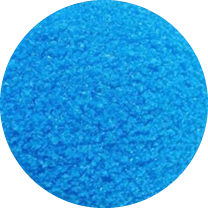
Limits for drinking water: 250 mg/l
- Without color, taste or odor
- Corrosion of metals and concrete
Removing sulphates from water
- Principle: reverse osmosis
Sulphates in addition to chlorides and carbonates, are the basic anions found in water. They have no negative effect on health. Only when high concentrations of sulphates are combined with high concentrations of magnesium, can the water have laxative effects. High concentrations of sulphates can cause corrosion to metals and, in particular, to concrete. When removing nitrates by ion exchange, sulphates are a complication because they reduce the capacity of the ion exchange resin and therefore it must be regenerated more often.
High sulphate concentrations usually cause over-limit conductivity. Therefore, similarly as with chlorides, reverse osmosis is used for their removal. Because reverse osmosis removes all minerals (demineralization) almost completely, a so-called by-pass is used. Part of the water flows through the bypass past the reverse osmosis and behind it mixes with demineralized water to obtain a suitable mineral content.
